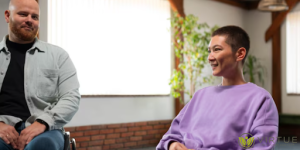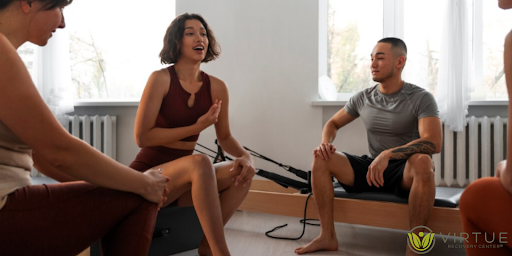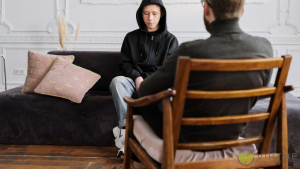Key Takeaways
- Social media makes alcohol use disorder (AUD) triggers worse in adults, which makes destructive drinking behaviors stronger.
- Austin’s alcohol rehab centers in Austin offer specific treatments that include detox, therapy, and relapse prevention that are customized to people who drink because of social media.
- Virtue Treatment Center is a model provider that uses evidence-based methods, including the Alcohol Detox Program and Group Therapy Program, to help people with AUD.
- How to Mentally Prepare for Drug and Alcohol Rehab teaches people how to think about things before they go to rehab so they may completely participate and thrive in their recovery.
A whole Alcohol Addiction Rehab program changes not only your physical health but also your mental and social well-being.
Introduction
Alcohol abuse is not a one-time thing; it is becoming more and more connected to our online lives. Getting back in touch with friends and relaxing with a few drinks may seem harmless, but tailored social media posts that glamorize alcohol can turn casual drinking into a compulsive alcohol use disorder (AUD). In this kind of world, grownups drink not only in person but also because of likes, stories, and the dread of missing out.
That’s why alcohol rehab centers in Austin are doing more to deal with the growing connection between social media and bad drinking habits. These organizations recognize that treatment must move beyond traditional approaches. It needs to explicitly deal with the harmful relationship between internet influence and drinking in real life.
How can social media posts make adults drink more?

Social media makes it easy to think of alcohol as a way to celebrate, connect, and succeed, which makes it attractive to copy. Studies reveal that adults who see content that focuses on alcohol are more likely to drink more (NIH). The drama of beautiful holiday photos, toasts, and branded drinks quietly reinforces the idea that drinking is fun and a sign of prestige.
But this normalcy hides a darker truth. The crafted feel-good moments online create a chemical feedback loop in the brain that causes dopamine rushes that are similar to the way people use drugs.
What components should a recovery facility include to address triggers originating from social media?
Urban treatment institutes like Virtue Treatment Center are creating all-encompassing programs to break this cycle. A medically supervised Alcohol Detox Program is often the first step in their approach. This is an important stage that recovery experts at NIAAA recommend to properly handle withdrawal and get the body ready for therapy.
From there, personalized behavioral treatments take center stage:
- Group Therapy Program: These peer-led sessions help individuals understand what triggers their automatic behaviors and develop strategies to overcome these urges.
- Cognitive-behavioral treatment (CBT) is an evidence-based method that helps people fight the thoughts that make them want to drink, such as urges that come from online content.
- Mindfulness and stress relief: These strategies are important substitutes for the dopamine hits that people initially sought through drinking and social interactions.
Each part works with the others to make a safety net that helps people take back control and build healthy ways to deal with stress.
Why is it important to get your mind ready before going to rehab?
Getting ready for rehab isn’t only about getting your body ready; you also need to get your mind ready. That’s when tools like How to Mentally Prepare for Drug and Alcohol Rehab become very important.
In an ideal world, mental preparation would include:
- Making specific goals, like staying sober or improving relationships
- Getting help from others to keep on track
- Fostering honesty and openness
- Planning to digitally detox by cutting down on screen time and alerts
How can Alcohol Addiction Rehab help people stay sober after detox?

After detox, Alcohol Addiction Rehab starts up where physical programs leave off. This step has:
- Individual and group therapy (CBT, motivational enhancement)
- Looking into what makes people relapse, notably peer pressure and social media
- Naltrexone or acamprosate as part of medication-assisted treatment (MAT) recommended by NIAAA
- Planned structured ways to avoid recurrence
An emphasis on making sober friends and daily routines
What lifestyle tools can help you stay sober in a world when everything is connected?
To learn how to live sober in the digital age, you need to have some valuable tips:
- Social media hygiene: Reduce the amount of alcohol-related images in your feeds, mute accounts that make you feel bad, and establish restrictions on how much you use them.
- Accountability partners: Get support and hold yourself accountable by joining recovery groups, both online and in person.
Replace drinking habits with morning exercise, mindfulness, or creative hobbies to make your routines healthier.
What can families and communities do to help these new forms of recovering?
It’s not possible to recover on your own. Families and communities are very important:
- Talk openly about how social media and alcohol affect people
- Setting stronger limits on how adults drink and what digital triggers they use
- Helping people go to rehab and keep attending to therapy sessions
- Showing how to have a better relationship with screens and drugs
Conclusion
Austin’s alcohol rehab centers in Austin are taking on a big job: they’re not just treating physical dependence; they’re also breaking down the subtle power of social media cues that make adults drink. These institutions offer integrated paths to sobriety through programs including the Alcohol Detox Program, the Group Therapy Program, and complete Alcohol Addiction Rehab.
By using evidence-based supports like medication-assisted treatment and peer networks, as well as mindset tools from How to Mentally Prepare for Drug and Alcohol Rehab, treatment can change lives and give recovering adults the power to use social media and live their lives without losing control or health.
Virtue Recovery Houston is ready to help you or someone you care about start that path. Call 866-457-4811 for more information.
FAQ
- What is distinctive about drinking that is caused by social media compared to other types of alcohol abuse?
Social media makes booze seem cool and gives people strong emotional clues. This changes the brain’s reward circuits and can make grownups want to drink compulsively even when they aren’t under stress. - Can detox alone help someone with AUD caused by social media?
Detox helps with the physical addiction, but to fully recover, you need to deal with emotional triggers, especially those that come from social media, and learn new ways to cope through therapy and continuing support. - How quickly does a Group Therapy Program lower the chance of relapse?
Peer therapy helps people see that they aren’t alone, which boosts their motivation and sense of responsibility. Studies show that being in a group like this helps people stay sober 20–30% longer than therapy alone. - Do you really need drugs like naltrexone?
Drugs can help with cravings and withdrawal symptoms. When used with therapy, they can help people stay sober by giving them a safe space throughout the early stages of recovery (NIAAA). - How can families support individuals who drink too much because of social media?
Families that are supportive talk openly about what sets them off, go to family therapy to help with recovery, and help make online and offline spaces better.
Citations
- National Institute on Alcohol Abuse and Alcoholism. The Cycle of Alcohol Addiction. 2024, https://www.niaaa.nih.gov/publications/cycle-alcohol-addiction
- National Institute on Alcohol Abuse and Alcoholism. Treatment for Alcohol Problems: Finding and Getting Help. 2024, https://www.niaaa.nih.gov/publications/brochures-and-fact-sheets/treatment-alcohol-problems-finding-and-getting-help
- Centers for Disease Control and Prevention. Alcohol Use. 2025, https://www.cdc.gov/alcohol/index.html








